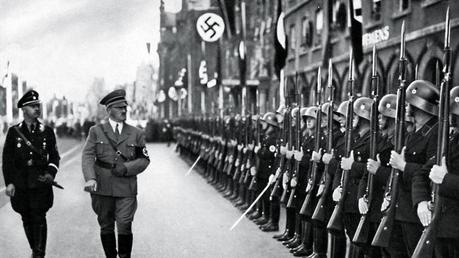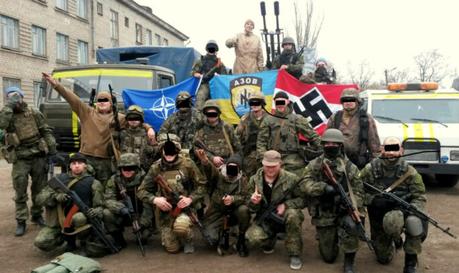 (Image from https://www.thetimes.co.uk/article/how-mi5-medals-duped-british-nazis-bj6v3rzcm)
(Image from https://www.thetimes.co.uk/article/how-mi5-medals-duped-british-nazis-bj6v3rzcm)
As far as I understand, Nazism was the unique combination of a who, a where and a when: Adolf Hitler and the post-WWI Germany. One person, one country and one time. Outside of those three elements there can be neither Nazis nor Nazism. None at all. The way this term is described on the Brittanica leaves no room but to conclude that Nazism is unrepeatable: it died alongside its leader and the disappearance of the precise historical circumstances under which it aroused. Not even in Germany can 'linger' any Nazism, since Hitler and the 1930's are very long gone. Therefore, talking about today's Nazis is as silly as talking about today's Aztecs, Huns or Vikings.
Now; someone could argue: "But Marxism was also the fruit of one person, country and time, yet it still exists." Well, I don't think so. First, because Marxism wasn't as intimately espoused to Marx as Nazism was to Hitler. Second, because it was basically an economic theory meant not just for Russia, but susceptible of (and aspiring to) be exported to many other nations in due time, whereas Nazism was by definition limited to a particular country and race. Third, because in the world of today, even in China or North Korea, real Marxism is outdated and totally unfeasible (supposing it was ever feasible at all). Contemporary citizens who call themselves Marxists don't probably know what they're talking about.
That's why I oppose the epithet 'Nazi' to be applied to present-day persons or ideologies. Out of commonplace hatred (totally justified, sure, but nonetheless induced) for the Nazi regime and the evil deeds perpetrated by Hitler's III Reich, 'Nazi' has now become a cliché synonym-normally with a political hue-of supremacist, racist, anti-immigrationist, anti-communist, antidemocratic, dictatorial, autocratic, criminal, etc.; when not a plain insult to spit at someone's face, like 'motherfucker' or 'son of a bitch'. Having uncle Adolf impersonated, throughout the past decades (and thanks-this must be said-to one of the most active, widespread and successful propaganda campaingns in history), all what is contemptible, heinous, base and hateful, the supreme exponent of human wickedness ever, nowadays it's so easy and tempting to just grab the word 'Nazi' and throw it at whomever we want to offend. But no matter how vicious, xenophobic, ruthless, or brutal a person may be, that doesn't make him a Nazi; not in the least. The overuse of that word impoverishes our language and speaking skills; obfuscates our speech or reveals our dazed thought-when not plain ignorance. By so much using it against anyone who doesn't share our ideology (generally, but by no means exclusively, conservative people), it has got wholly devoid of its original meaning, to the point that most dictionaries, under that entry (in lower case), include meanings like "a person regarded as fascistic in views or behaviour", or even simply "a harshly domeneering, dictatorial or intolerant person". In the future, probably, this will remain the first-if not the only-sense of the word.
And that's also why I haven't quite bought Putin's plea that one of the goals of his military operation in Ukraine is to 'de-nazify' that country. Certainly I understand-or I believe I do-why he says that, but nonetheless I don't like it. Taking into account the unprecedented, colossal amount of casualties, most of them Russian slavs, that the USSR endured along WWII fighting against the (real) Nazis, I think he's using this term to better touch his people's feelings and get their unawavering support. But, at the end of the day, he's telling a lie, because there aren't any Nazis in Ukraine-nor anywhere else, for that matter-and he knows it. Unless, of course (and this is a possibility that we shouldn't totally disregard), what he really means is de-neo-nazify, purge Ukraine of Neo-Nazis; in whose case he should have said so, I think.
But then, are there Neo-Nazis in Ukraine? Well - unfortunately, here we can't resort to the Brittanica, since this encyclopaedia doesn't have an entry for Neo-Nazism. As a matter of fact, none of the internet resources I've found-save the politically and historically biased Wikipedia-says anythig conclusive about it. Thus, according to the Wiki, the term "describes any post-World War II militant, social or political movements seeking to revive the ideology of Nazism in whole or in part". Fine. But this 'or in part' is crucial, because when we go on reading, the Wiki says that "it may borrow elements [like] ultranationalism, anti-communism, racism, ableism, xenophobia, homophobia, anti-Romanyism [and] antisemitism". In other words: virtually anything someone may not like; specially the progressives. In fact, the ambiguity or inaccuracy of this definition can be assessed by simply observing the amount of countries that, as to the Wiki, host or have hosted Neo-Nazi organizations: no more no less than 39! Among them, of course, Russia and Ukraine too. Needless to say I haven't read them all; but I've noticed an interesting detail: the entry for Ukrainian Neo-Nazism is, by far, the longest of all 39. Therefore-one might infere-if there is a One country where there are Neo-Nazis, that One is Ukraine.

Anyway, this doesn't make the epithet 'Neo-Nazi' any preferable, to me, over 'Nazi'. Even worse, I dare say, because of its very vastness. Certainly, the Azov Battallion (plus the Aidar and some other) may perfectly fit into the ample definition of 'Neo-Nazi'; but then I'm sure that, were I to found a political party tomorrow, the Wiki editors would hasten to include me in their list, too.
Nope. In my opinion, none of this seems suitable. There are more proper words to name such concepts. If one feels the absolute need to resort to the boogeyman, yet avoid the anachronism, one may use derivaties like 'philo-nazi', 'nazi-ish' or 'nazi-like', for instance. On a more honest, less manipulative approach, one might use the word 'fascist', which is less anachronistic and relates to an ideology or movement not particularly linked to one specific person and country (as happens with 'Marxist'). However, for naming things I'm definitely in favour of using the existing precise words; and here we're in no shortage of them. The Azov Battallion and other fascist Ukrainian paramilitary are extremely radicalized groups in whose ideologized ranks serve lots (maybe a majority) of fanatical, brutal, sadist and merciless torturers and butchers, proven, among other nasty deeds, to have burnt civilians alive, massacred Ukrainian russophone population and castrated Russian war prisoners; and that's what they should be called: not Nazis (which are, as argumented, unrepeatable), but slaughterers and assassins. Appealing to the Russians' historical sentiments is legitimate, but if Putin aspired to sound more plausible abroad, I think he should have said 'de-criminalize Ukraine' instead. That is, in my opinion, the point to stress on and what may contribute to back the special military operation.

